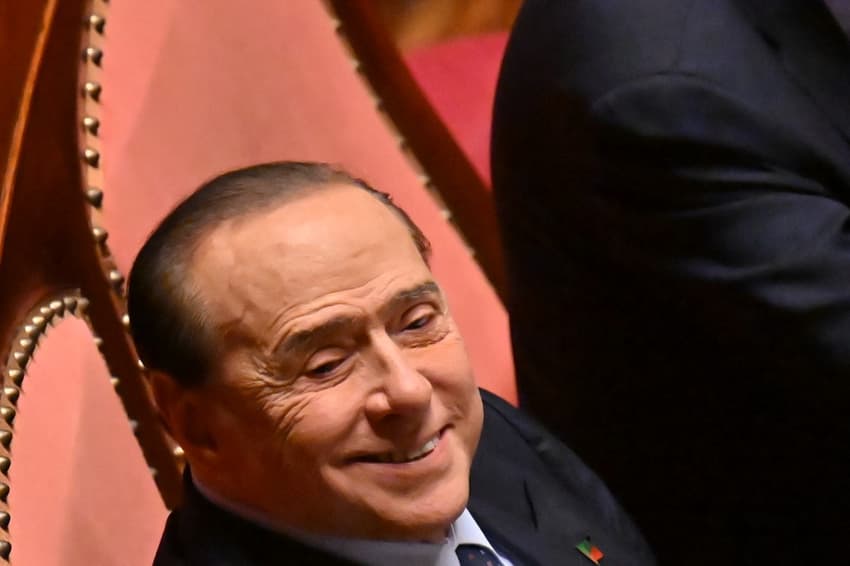Italy's Berlusconi under fire for promising Monza players 'busload of hookers'

Italian senator and Monza football club owner Silvio Berlusconi on Tuesday promised players a "busload" of prostitutes if they win upcoming Serie A matches, drawing fierce criticism from female MPs.
Speaking at a Christmas dinner on Tuesday night in front of sponsors and a players' delegation, scandal-plagued former Italian prime minister Berlusconi said that he wanted to give his players "extra encouragement" ahead of the second half of the Serie A season which begins on January 4th.
"I told them that coming up we have Juventus, Milan, etc. and that if they manage to beat one of those great teams I'll send a busload of whores to the dressing room," Berlusconi said in a speech which was greeted with laughter in the room and later widely shared on social media.
Parole indegne, ancora più ignobili se a proferirle è un senatore della Repubblica e leader di un partito.
Becero sessismo usato come goliardia.
Ricordo che Meloni, Salvini e Tajani volevano #Berlusconi #PresidentedellaRepubblica. pic.twitter.com/EBpTUOBZ42
— Laura Boldrini (@lauraboldrini) December 14, 2022
The 86-year-old tycoon was recently re-elected as a senator in the Italian parliament after a nine-year absence due to a tax fraud conviction.
On Wednesday, Five Star Movement Emma Pavanelli asked in parliament what Giorgia Meloni, the country's first woman prime minister and an ally of Berlusconi, thought of "those shameful words".
READ ALSO: Italian prosecutors seek six-year jail term for Berlusconi in ‘Ruby ter’ trial
Former president of the parliament's lower house and current MP Laura Boldrini blasted "vulgar sexism passed off as banter".
"Obscene comments, made even more despicable by the fact they were uttered by a senator of the republic and a party leader," Boldrini said on Twitter.
Daniela Sbrollini, a female senator from the centrist Italia Viva party, called it the "usual misogynist language from Berlusconi: a joke in bad taste that leaves you speechless".
Berlusconi is still widely associated in Italy and abroad with the 'Rubygate' sex parties he organised with young women, some of which were found to be minors.
He was acquitted of underage prostitution charges but remains on trial for witness tampering in that case.
Berlusconi bought Monza football club in 2018 for a reported three millions euros.
Monza declined to comment on Berlusconi's speech when contacted by AFP.
Comments
See Also
Speaking at a Christmas dinner on Tuesday night in front of sponsors and a players' delegation, scandal-plagued former Italian prime minister Berlusconi said that he wanted to give his players "extra encouragement" ahead of the second half of the Serie A season which begins on January 4th.
"I told them that coming up we have Juventus, Milan, etc. and that if they manage to beat one of those great teams I'll send a busload of whores to the dressing room," Berlusconi said in a speech which was greeted with laughter in the room and later widely shared on social media.
Parole indegne, ancora più ignobili se a proferirle è un senatore della Repubblica e leader di un partito.
— Laura Boldrini (@lauraboldrini) December 14, 2022
Becero sessismo usato come goliardia.
Ricordo che Meloni, Salvini e Tajani volevano #Berlusconi #PresidentedellaRepubblica. pic.twitter.com/EBpTUOBZ42
The 86-year-old tycoon was recently re-elected as a senator in the Italian parliament after a nine-year absence due to a tax fraud conviction.
On Wednesday, Five Star Movement Emma Pavanelli asked in parliament what Giorgia Meloni, the country's first woman prime minister and an ally of Berlusconi, thought of "those shameful words".
READ ALSO: Italian prosecutors seek six-year jail term for Berlusconi in ‘Ruby ter’ trial
Former president of the parliament's lower house and current MP Laura Boldrini blasted "vulgar sexism passed off as banter".
"Obscene comments, made even more despicable by the fact they were uttered by a senator of the republic and a party leader," Boldrini said on Twitter.
Daniela Sbrollini, a female senator from the centrist Italia Viva party, called it the "usual misogynist language from Berlusconi: a joke in bad taste that leaves you speechless".
Berlusconi is still widely associated in Italy and abroad with the 'Rubygate' sex parties he organised with young women, some of which were found to be minors.
He was acquitted of underage prostitution charges but remains on trial for witness tampering in that case.
Berlusconi bought Monza football club in 2018 for a reported three millions euros.
Monza declined to comment on Berlusconi's speech when contacted by AFP.
Join the conversation in our comments section below. Share your own views and experience and if you have a question or suggestion for our journalists then email us at [email protected].
Please keep comments civil, constructive and on topic – and make sure to read our terms of use before getting involved.
Please log in here to leave a comment.